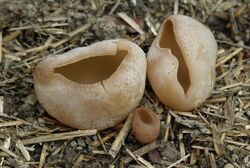Biology:Peziza vesiculosa: Difference between revisions
(simplify) |
(fixing) |
||
| Line 8: | Line 8: | ||
}} | }} | ||
'''''Peziza vesiculosa''''' is a species of apothecial | '''''Peziza vesiculosa''''', commonly known as the '''common dung cup''',<ref>{{cite book |last1=Arora |first1=David |title=Mushrooms demystified: a comprehensive guide to the fleshy fungi |date=1986 |publisher=Ten Speed Press |location=Berkeley |isbn=978-0-89815-169-5 |edition=Second}}</ref> is a species of apothecial fungus belonging to the family [[Biology:Pezizaceae|Pezizaceae]]. | ||
== Description == | |||
The pale, cup-shaped [[Biology:Ascocarp|ascocarp]]s grow to {{convert|1-6|cm|abbr=off|frac=2}} in width and often form clusters. The [[Biology:Spore print|spore print]] is white.<ref name=":0">{{Cite book |last=Audubon |title=Mushrooms of North America |publisher=Knopf |year=2023 |isbn=978-0-593-31998-7 |pages=23}}</ref> | |||
=== Similar species === | |||
The species is difficult to identify from other ''[[Biology:Peziza|Peziza]]'' without microscopy.<ref name=":0" /> Species with purplish tints, particularly within the cup, have been split off into ''Geoscypha''. Similar species may also be found in the ''[[Biology:Tarzetta|Tarzetta]]'' and ''[[Biology:Jafnea|Jafnea]]'' genera, as well as purplish species of ''Legaliana'' and ''Phylloscypha''.<ref name=":0" /> | |||
== Distribution and habitat == | |||
The species can be found year-round throughout North America; usually within its December–April season on the West Coast.<ref name=":0" /> It is common in Europe, with scattered records in other parts of the world. It is found on nutrient-rich soils, e.g. [[Chemistry:Manure|manure]] and [[Chemistry:Compost|compost]].<ref name=":0" /> | |||
== Toxicity == | |||
The species is considered [[Medicine:Mushroom poisoning|poisonous]].<ref>{{cite book |last=Phillips |first=Roger |title=Mushrooms and Other Fungi of North America |year=2010 |publisher=Firefly Books |location=Buffalo, NY |isbn=978-1-55407-651-2 |page=371}}</ref> | |||
==References== | ==References== | ||
{{Reflist}} | {{Mycomorphbox | ||
| name = ''{{PAGENAME}}''{{italic title}} | |||
| hymeniumType = smooth | |||
| capShape = no | |||
| whichGills = NA | |||
| stipeCharacter = NA | |||
| ecologicalType = saprotrophic | |||
| howEdible = poisonous | |||
}}{{Reflist}} | |||
==Further reading== | ==Further reading== | ||
Latest revision as of 04:37, 21 May 2025
| Peziza vesiculosa | |
|---|---|

| |
| Scientific classification | |
| Domain: | Eukaryota |
| Kingdom: | Fungi |
| Division: | Ascomycota |
| Class: | Pezizomycetes |
| Order: | Pezizales |
| Family: | Pezizaceae |
| Genus: | Peziza |
| Species: | P. vesiculosa
|
| Binomial name | |
| Peziza vesiculosa Bull. (1790)
| |
Peziza vesiculosa, commonly known as the common dung cup,[1] is a species of apothecial fungus belonging to the family Pezizaceae.
Description
The pale, cup-shaped ascocarps grow to 1–6 centimetres (1⁄2–2 1⁄2 inches) in width and often form clusters. The spore print is white.[2]
Similar species
The species is difficult to identify from other Peziza without microscopy.[2] Species with purplish tints, particularly within the cup, have been split off into Geoscypha. Similar species may also be found in the Tarzetta and Jafnea genera, as well as purplish species of Legaliana and Phylloscypha.[2]
Distribution and habitat
The species can be found year-round throughout North America; usually within its December–April season on the West Coast.[2] It is common in Europe, with scattered records in other parts of the world. It is found on nutrient-rich soils, e.g. manure and compost.[2]
Toxicity
The species is considered poisonous.[3]
References
| Peziza vesiculosa | |
|---|---|
| Mycological characteristics | |
| smooth hymenium | |
| no distinct cap | |
| hymenium attachment is not applicable | |
| lacks a stipe | |
| ecology is saprotrophic | |
| edibility: poisonous | |
- ↑ Arora, David (1986). Mushrooms demystified: a comprehensive guide to the fleshy fungi (Second ed.). Berkeley: Ten Speed Press. ISBN 978-0-89815-169-5.
- ↑ 2.0 2.1 2.2 2.3 2.4 Audubon (2023). Mushrooms of North America. Knopf. pp. 23. ISBN 978-0-593-31998-7.
- ↑ Phillips, Roger (2010). Mushrooms and Other Fungi of North America. Buffalo, NY: Firefly Books. p. 371. ISBN 978-1-55407-651-2.
Further reading
- Jordan, Michael (2004). The Encyclopedia of Fungi of Britain and Europe. Frances Lincoln Publishers. p. 49. ISBN 978-0-7112-2379-0.
- Buczacki, Stefan (1992). Collins Guide to Mushrooms and Toadstools of Britain and Europe. HarperCollins. p. 218. ISBN 0-00-219978-5.
External links
- Peziza vesiculosa in Index Fungorum
- Peziza vesiculosa at GBIF
Wikidata ☰ Q881801 entry
 |

